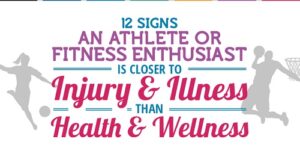Toxic training: How to recognize the signs of an athlete in trouble
Toxic training: How to recognize the signs of an athlete in trouble

How to know when ‘healthy’ becomes dangerous
by Kim Travis, Healthcare Advocate
Rachael Steil was a cross country and track runner who found a small correlation between losing weight and running faster. She took that discovery and ran with it:
“I went from eating normal, regular, healthy meals to very regimented, restricted meals that left me hungry, but feeling excited because I associated this new way of eating with being a more successful runner. I wanted perfection and to find out how fast I could run, and would do anything to get there.”
– Rachel
Despite shin splints and painful stress fractures, Lindsey Hall went to the gym two times a day, sometimes three, and ran herself to exhaustion. In her early twenties, she became preoccupied with veganism and clean, raw eating:
“Everything was ‘bad.’ It evolved to a point where nothing I ate was acceptable.”
– Lindsey
Beth Beck was a high school tennis star. College tennis was within her reach but she had to get bigger, taller, stronger. She got bigger and stronger. She peaked at 4 feet, 11.5 inches. Nevertheless, Penn State came calling, but the dream faded fast:
“I had a chip on my shoulder about the whole tennis thing from go. I was the star. It was weird for me not to be the star. It didn’t help that tennis wasn’t even a little bit fun anymore, and my body hurt all the time from lifting weights, doing sprints and not taking care of myself in the least.”
– Beth
How winning can trigger a health crisis
Stories like these are not rare. Rachael, Lindsey and Beth, like many young women, and men, may feel powerful and accomplished, but in reality, they’re closer to injury and illness than health and wellness. In the U.S. and in many other countries, people like Rachael, Lindsey and Beth are encouraged to work harder, get stronger, lose more weight, be the best, win! Parents, coaches and trainers are often the ones who cheer them on and don’t see the situation for what it really is: a health crisis — at least not at first.
Eating disorders typically manifest due to a combination of biological, psychological and/or social issues. And, excessive exercise plays a role in both the development and maintenance of a variety of eating disorders.
Because the early signs of exercise addiction and eating disorders often mimic the behaviors of an individual who is following a strict, but healthy eating and fitness program, parents, coaches and trainers can easily miss the warning signs of exercise addiction and eating disorders. Furthermore, they may contribute to the problem because of their attitudes about weight, dieting and body image.
Heed the signs to guard against injury and illness
This infographic (linked and below), developed by clinicians at EDCare, was designed to educate parents, coaches, trainers and anyone who works in the fitness industry about the signs that an athlete or fitness enthusiast is closer to injury and illness than health and wellness. It also offers tips on how to encourage a healthy attitude about sport and fitness — and that includes:
- Evaluating one’s own attitude about weight, dieting and body image
- Deemphasizing the importance of weight
- Resisting the urge to make comments, particularly derogatory comments, about weight
About Kim Travis

Kim is EDCare’s Director of Marketing and a Colorado native. She holds a Bachelor’s Degree in Organizational Leadership from CSU and has over 25 years of healthcare experience in marketing and operations. In her free time, Kim enjoys the outdoors and visiting the beautiful Rocky Mountains. She loves to garden, cook and most of all she enjoys spending time with her husband two daughters.






